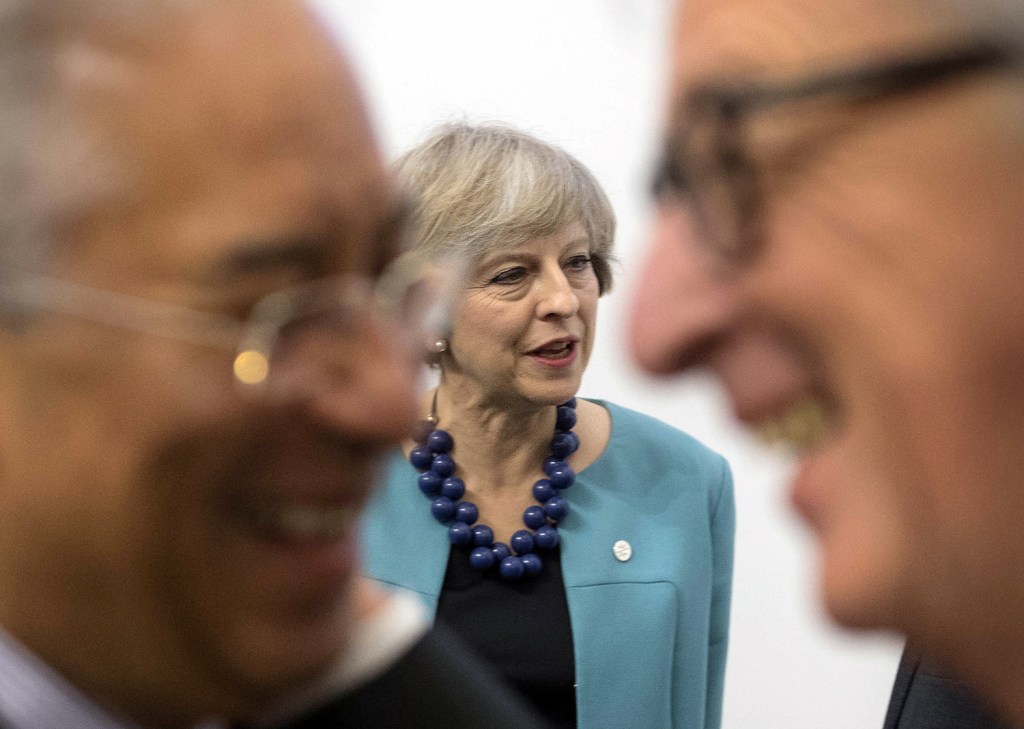(Top photo: Theresa May. Photo: Stefan Rousseau PA Wire/PA Images)
Donald Trump and Theresa May, as we know, are in love with each other, and they love to show it off by holding hands, and meeting the Queen together, and presenting each other with gifts of, you know, the right to run the NHS and that kind of stuff. Their love might be dismissed by some as a marriage of convenience: embattled would-be dictator meets girl desperate for someone, anyone, to pump enough capital into her nation’s economy to stop it from collapsing after Brexit. But in fact – as a number of other commentators have noted, including James Butler in this very publication – it’s clear that what’s bringing them together is, as much as anything else, their shared ideological programme.
Videos by VICE
On the one hand there’s the hungry, all-consuming global capitalism that they are more than happy to feed body after body to by dismantling healthcare provision, state education, welfare and so forth. On the other: an oppressively backwards nativism, the instinct of every provincial, swamp-ridden village to sacrifice any unsuspecting outsiders to their Old Gods, now written into bureaucratic procedure as government policy. This ideological programme is of course inhuman on every level, weaponising as it does the worst instincts of their supporters to ensure their continued endorsement of a political system that functions contrary to their interests.
But here’s an odd thing. When Donald Trump does all this bad stuff, it’s seemingly obvious to everyone. Granted, this has so far not hampered him at all, but his presidency has already seen pretty much daily calls for his impeachment, as well as mass protests against his rule not only in the United States but throughout the globe, especially in relation to his Muslim-country travel ban.
But when Theresa May does it, she’s never able to trigger anything like the same reaction.
For instance: one of the most especially vile aspects of Trump’s travel ban was the indefinite suspension it placed on Syrian refugees being able to enter the country. This was, rightly, something that millions of people rose up in protest against. But yesterday, May’s government quietly announced a policy that, in terms of its actual effects, will be basically very similar. Cameron’s government had previously, amid some controversy, indicated that it would take in up to 3,000 Syrian child refugees (a frankly miserly figure, considering that this was out of some 90,000 unaccompanied minors total). But now, the government has said, the UK would be taking in just 350 of these urgently vulnerable children.
There’s been some criticism of May (and her Home Secretary, Amber Rudd) in parliament and on social media, but on the one hand: a) it’s mostly been drowned out by Jeremy Corbyn continuing his Leicester-like transformation from miracle to mediocrity over the Article 50 vote; and b) a lot of the starkest criticism has involved actively comparing May to Trump, as if the latter is the measure of all bad things and she’s just a politician who is usually mostly alright?
More to the point: if Trump’s ban could lead to emergency protests in this country – a nation that, let’s not forget, he does not actually govern – why hasn’t May’s?
Why, in short, is it so easy to get people excited over the evil things a furious, shuddering ball of orange wax does, but relatively so much harder to get them to rise up in anger over the starkly similar actions of something that looks, mostly, like a human being?
The big problem that many of Trump’s enemies seem to have with him is that he just doesn’t look and sound like he ought to be President of the United States. By contrast, Theresa May looks and sounds exactly like she ought to be British Prime Minister: stirring up some primal identification with authority by being every bit as stern and well-turned-out and unable to quite countenance any flights of energy or imagination as a primary school headmistress. So even when people do find something to contest in her policies, they find it hard, ultimately, to contest her right to be in charge.
This was why May was heralded as a “safe pair of hands” when coming in as Prime Minister after the referendum, despite her record of barbarism and incompetence as Home Secretary. It’s why her demented Brexit plans have apparently been welcomed with such widespread consensus that parliament has opted to give itself zero oversight over the whole process. It’s why May is able to own up, quite happily and with no apparent consequences, to having lied to the House of Commons about a failed nuclear test. And through all this, it’s what lends all of her excesses their grey air of inevitability, as if they have been ordered from deep within reality and simply cannot be contested, so no one ought to bother.
A similar thing, you’ll remember, happened with David Cameron: he looked and sounded to many like he ought to be Prime Minister as well, yet throughout his tenure he governed as the most disastrous, balloon-looking thing since the Hindenburg. And now look where we are: saddled with a political system compelled to destroy itself in the name of what David Davis would refer to as our “patriotic duty”. For our own sakes, we need to find it in us to be angry at Theresa May, at all times and in as extreme a way as we can muster.




